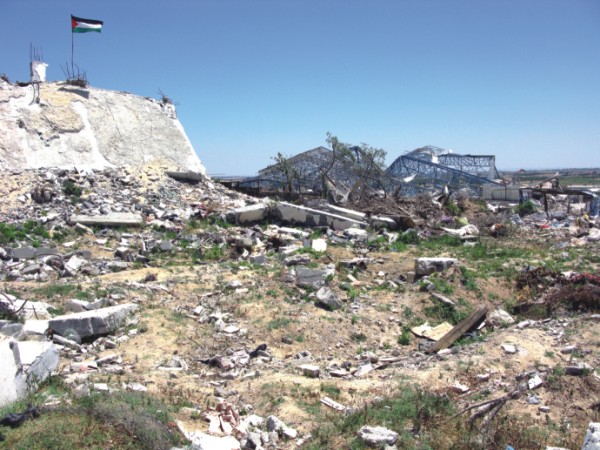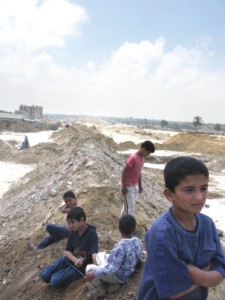Writing the Wrong
On Peace Prizes and Politics
Sharbari Ahmed
 |
| Rubble of an industrial centre in Gaza - part of the deliberate bulldozing and demolition during the ground invasion. Photo: Sammer Aboelela. |
President Obama won the Nobel Peace Prize the other day. Or as I like to call it, “The Thank You For Not Being Bush and not Bombing Iran Prize.”
The crown on Obama's head just got a little weightier. I have a few suggestions of what he could do with the money; there are some people in Gaza who could use it since unemployment is at nearly 75% there. Or perhaps he could donate it towards a free Tibet. But he cannot, can he? As giving money to the Palestinians is considered an act of terrorism and the Chinese might want us to make good on all the money we owe them. I think the Dalai Lama can hang out in Dharamsala a little bit longer. At least until we figure out how to get all the gold in Fort Knox back in our name.
Until then, we will be counting on a handful of brave, principled souls toiling away to free Tibet, or give oppressed people a voice. These people are most likely never going to win a prize of any sort, they are not politicians with pedigrees, some are homemakers, and chemical engineers. Some will even die in the process of resisting violence, bigotry and injustice. They are on the ground, standing in front of tanks, or spending countless hours in the halls of “justice” fighting for the rights of people who cannot fight for themselves. The real ones, the ones, who have it figured out actually de-politicise it. They keep it simple. They make it about our collective humanity. One such person is a new friend of mine, Sammer Aboelela, an Egyptian-American from New Jersey who travelled to Gaza this past spring on a humanitarian mission.
I had the opportunity to interview him.
 |
Boys in Rafah look at the debris that was once their neighbourhood. Photo: Sammer Aboelela |
What were you doing in Gaza?
During the three-week-long attack upon the population, I was simply transfixed upon what little bit of news was coming out of Gaza. Since journalists were banned by the Israeli government from entering Gaza to cover the atrocities, most American news outlets chose to report little more than the Israeli government narrative. The largely homemade rockets foolishly and recklessly fired at Israeli towns by Hamas were cited as ample justification for the onslaught that would eventually kill about 1500 people (mostly civilian) and annihilate neighbourhoods, schools, businesses, families, and critical infrastructure. This justification was presented without any frame of reference or, to be more accurate, a completely reversed frame of reference: in the mainstream American view that would be repeated nearly every minute of every hour on every outlet, Israel was not the aggressor for its years of blockade and decades of occupation and oppression of Gaza, it was ever the victim of unexplainable Palestinian violence. This view was repeated by nearly every politician, especially here in New York.
Fortunately, we live in the age of the Internet. Online, I was able to read and watch news coverage from around the globe that offered much more depth and background in their reporting of the crisis. During those three weeks, I'm not sure if my television was ever turned on -- I was at my computer watching, reading, and listening to the horrors of a regional superpower decimating a largely unarmed civilian population.
But as valuable as those online resources were, nothing can ever compare to seeing a situation firsthand, so when I learned that a delegation of independent journalists and activists were going to Gaza I immediately joined. My goal was to gain insight into what actually happened during the attack and the conditions that Gazan Palestinians are continuing to deal with as a result, then share what I learned with as many people as possible.
I believe that part of my compulsion [to go there] is that I understand the language and culture of Gaza more than most Americans, being an Arab myself. When I see footage of the atrocities committed there, I hear and understand when children are crying for their parents or mothers for their children their words are not just meaningless wails of pain. I believe it to be the responsibility of those of us who have a foot in two cultures to try to bridge the gap when we can
Once you were there, what did you see? Please describe the physical environment.
First, let me say that Gaza is beautiful. I know that must sound strange, but it struck me right away… between the palm trees, the coastline, the lush farms, and the people, Gaza is visually and emotionally stunning. This, of course, stands in stark contrast to the horrors regularly visited upon the population which are readily evidenced by the damage to just about every single structure in Gaza. Roads, homes, and buildings all suffer some degree of destruction: sometimes just a few bullet holes, sometimes larger mortar holes and an entire collapsed wall, but very often once respectable homes, schools, hospitals, and businesses stand as nothing more than a pile of twisted steel, concrete rubble, and fragments of domestic life. We met large families living in tents right beside the rubble of their home. By now, most people have heard that the Israeli blockade has denied the necessary building supplies required to build Gaza from entering; however, we heard a much more basic complaint from the families. The rubble beside which they were living presented a tremendous hazard to themselves and their children as unexploded bombs remained inside, and the sharp glass and steel shards presented a severe risk to children with nowhere else to play.
And this brings us to the blockade of Gaza -- the siege as it is more correctly called. It is difficult to explain just how all-encompassing the restrictions upon Gaza were before the attacks and how they have only become worse since. When Israel declared a ceasefire days before President Obama's inauguration, I sincerely thought that major hostilities had come to an end. In truth, however, there is no ceasefire in Gaza.
In addition to the crippling restrictions on imports into Gaza which so severely limit food, medicines, and humanitarian aid that it has led to skyrocketing malnutrition amongst the children, Israel violently limits farming and fishing within Gaza itself. A so-called “buffer zone” is enforced within Gaza along its border with Israel consuming about 25% of its precious agricultural land. Farmers who try to work their own land are often injured or killed for engaging in nothing more than their trade.
Fishers suffer similar restrictions. While Israel and the international community have agreed in recent accords that Gazan territorial waters extend 20 nautical miles off the mainland and that fishers are permitted to utilize this entire distance, the IDF has imposed a 3-mile limit for any Palestinian vessel. This means that any vessel that ventures beyond 3 nautical miles from shore is subject to gunfire, seizure, and abduction of the fishing crew.
Between the blockade of its borders, and the aggression against fishers and farmers, every means of sustenance in Gaza is under attack.
Were you detained at any time?
No.
How were you treated?
This is an interesting question. I suppose that before going I had assumed there would be some hostility from those who had suffered through the atrocities earlier this year. After all, it was our tax dollars that made those horrors a possibility, and there isn't a person in Gaza who isn't painfully aware of that fact.
In fact, hospitality is central to Palestinian identity and despite the blockade, hospitality was in no short supply. When resisting an oppressor whose actions would indicate a desire to eliminate every shred of identity, the expression of hospitality and other aspects of identity become part of the resistance. While schools and homes can be destroyed, the self can only be surrendered, and there is no sign of this in Palestinian society.
Tell me about the Gazans: their overall attitude in the face of devastation and relentless intimidation.
What I witnessed in most people was an outlook somewhere between hope and despair, and a sense that it was dangerous to yield completely to either one. At the Gaza Community Health Program, we spoke with mental health professionals who described some common manifestations of the ever-present trauma. Bedwetting and hyperactivity have been widespread amongst the children since the attacks, the latter being easily observed in our own interactions at the schools we visited.
On the whole, however, Gazans are characterised by a commitment to society. Indeed, this is the aspect that I would say defines the contours of the resistance. To deal with the blockade, they dig tunnels. To cope with the loss of agricultural land seized by so-called “buffer zones,” they are working on urban rooftop gardening projects. Even fishing and farming under the violent threat of injury or death are taken on as modes of resistance. Societal survival is the primary cause and form of the resistance.
Will you go again?
I will definitely go again. It is important to bear witness and gain insight on situations that are covered so poorly by the corporate press. I encourage anyone with the means to go to Gaza to make the trip and stand in solidarity with Palestinians.
Copyright
(R) thedailystar.net 2009 |
